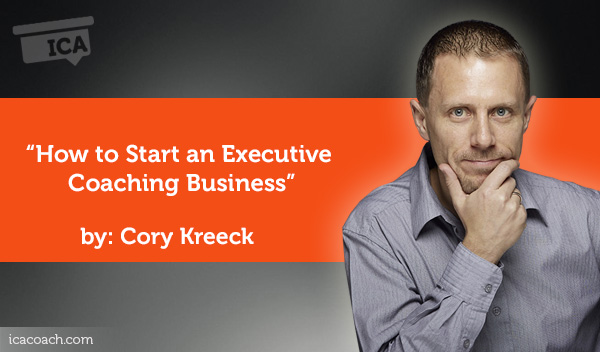
Research Paper By Cory Kreeck
(Life Coach, UNITED STATES)
Where to start, what to skip and one dirty secret

Over $500 per hour is the average hourly wage companies pay executive coaches according to Nadeem Ifkhar, PCC. At 40-hour a week, that is over 1 million dollars a year! This might be part of the reason the coaching industry has exploded over the past decade. Marketresearch.com shows that the coaching industry alone was worth over 1 billion dollars in 2016 with an average growth rate of 6.7% per year. Aspiring coaches, get excited. But first, a closer look:
A coach does not bill 40-hours each week. In fact, the one thing a new coach will do more than anything else (if they want to be successful) is engage potential clients in what can best be described as a sales call. Before you can bill anything, you need somebody to bill. Too many coaches spend their time training to be an amazing coach and avoid (often at all costs), developing a meaningful pipeline of potential clients. Now it makes more sense why the average coach in the US earns about $62,000 year. Good money for sure, but well short of the million dollars a year I thought I would be making when I read the summary industry data.
As with coaching, understanding comes through self-discovery and practice. This is for aspiring coaches or anybody who wants to understand the emerging (and unregulated) coaching industry. You will find some insight and resources here as we explore where to start, what to skip and one dirty secret about the coaching industry. To set the stage, the average coach does not make 1 million dollars each year, but I do know 5 executive coaches who consistently earn a 6-figure income. You could to with some discipline.
Where to Start
Coaching is described as, “Partnering with clients in a thought-provoking and creative process that inspires tem to maximize their personal and professional potential,” by The International Coaching Federation (ICF). The federation further clarifies that coaching is not therapy, consulting, mentoring or training. If you want to be a coach:
- Decide what is important to you based on the facts.
- Decide why you are doing it for you and how you will spend your time
- Anybody who tells you “this is the way to do it”
- Be yourself, be different. Be unique – that is why you will be successful
- Get connected: nationally and locally
Two main Bodies
ICF – access without spending money
Ioc – access @ 180 and 80 is deductible as donation (all might be too if you claim the business expense – see your tax advisor)
Join a peer coaching group that matches your niche (less than 200), practice and be coached (I joined this. There are others. Make it about your niche
Go to local meet ups
Attend the free online training sessions
Get enough training, not too much
Wendy Buckingham of Life Coaching Professionally warns,
Get very clear on the benefits you want to receive by belonging to a life coaching associating before you commit to membership…
She offers six criteria for choosing an association in the article, Why Join a Life Coaching Association:
- Confirm association is truly independent
- Know if they offer marketing support
- Learn about their referral system for new clients
- What mentoring and supervision do they provide
- Understand the membership restrictions
- Clarify all the community benefits firsts
Read the full article for more details but do connect with other coaches to learn more about the industry and how to get started. Remember, not everybody’s tips should be put into action. Gather information (but not too much) and decide for yourself how to proceed.
Clarify your niche and who needs you as a coach. Be with those people most! Go to where coaches are needed, not where coaches congregate. Go there to learn and grow.
What to Skip
Beware of people who tell you the one way or are “connected to your outcome” (ICF competency). The facts prove you have what it takes and here are 5 reasons why.
One Dirty Secret
There is no one way. Only your way.
Here is the secret based on my experience after a decade in sales and another decade in training.
When it comes to getting work done, training is important but it can really get in the way. I have learned that the best training is getting started. This from somebody who has spent the last decade leading training and development organizations. Training is important but only impacts change when it is coupled with actual relevant work. Before committing to the field of learning full time, I was a field sales manager for Avon.
I hosted hundreds of sales rallies and developed strong working relationships with Independent Avon Sales Representatives around the county. I learned to recognize two types of people in the business. I would only be in any one city three of four times a year. I would meet excited Representatives who were eager to show me there progress since the last time we met.
There were a lot of Representatives who were eager to show me all of the training they have completed. I was so happy for them. Over time, I learned that the vast majority of people who finished all of their training really never sold very much. They enjoyed the learning, not the selling. Their business was not successful and they usually left the business after a few months.
On the other hand, I would meet Representatives at these sales rallies who were completely disorganized. They didn’t even know how to access the online learning. But, they had orders on slips of paper and napkins. They needed help submitting orders (because they were out selling, not at the computer training).
The people who spent time doing the work, found the resources and support (training) they needed to resolve the details (placing orders, putting cash in the bank, etc). Most of the people who finished all the training “first,” moved on to the next exciting thing after training was complete because they enjoyed learning but not much selling. Extensive training gave them the feeling of accomplishment (look at all the training I’ve done), without the result they wanted (earn money working for themselves).
As aspiring coaches, we risk the same trap. Spending all of our time training when what we really need is to get to work. If we have decided being a coach is the job we want, then there is usually something in our background and experience that has led us to this decision. We’ve done something that led us to believe we could “be a coach.” Our friends, family or coworkers have told us that we would, be a good coach.” The point is, we are already (at least a little) ready. So, skip the training and get to work!
Wait. What? No training? Ok, not exactly. But, I will tell you that some of the best coaches I have worked with over the years have NOT been formally trained as coaches. They brought
their coaching, mentoring and consulting skills to the table as a coach and it is working for them. More important, it is working for their clients. They DO NOT hit all of the PCC markers for an ICF coach, but the DO have a powerful, positive impact on their clients and the world.
So, now what? . . . get started. Lean into the things that led you to decide to be a coach. Spend time coaching every single week. Volunteer your time as a coach. Offer to provide coaching for people you respect as a way to start your business and after a few sessions, ask for them to write a short referral. You need some success stories. Get started. By the way, most success stories have a few missteps, mistakes and disasters behind them. Start writing the book of your success stories without fear of making mistakes. Accept that you ARE going to make mistakes. Get out there and make them. Then, you can decide how much training your need.
The secret about coaching is that there is a lot of money in training coaches. A LOT. For perspective, a Google search for “find an executive coach” returns about 171 million pages (so there is a market). A Google search for “Start a coaching business” 344 million pages (almost exactly double). The simple math tells us there is twice the effort to train coaches than there is demand for coaches. Do not be discouraged. You can be a successful coach, here are two traps to avoid:
1. Over-training. Spend so much time and money on your coach training that you can never make a profit on the business.
2. Trying to be somebody else. I evaluated 38 coach training programs and exactly 1 did not claim to have the one coaching methodology that would make me successful.
Now you know the secret about coaching. It’s the same for real estate, insurance and many other businesses. The allure of being your own boss is strong! When we decide to be our own boss, we pick a field and look for training. Good. Mark Twain (and later Garrett Gee) said that we should not let our schooling get in the way of our education. So, get started! Do some coaching and then add some training to your experience. Invest time in training to GET BETTER, not to get started or to get perfect. Above all, be yourself. Be true to the person you were created to be and the calling on your life. You are ready!
Consider these examples
Case study of 1 paragraph analyzing each of the 5 “coach types” I know (and pricing structure). All 5 have been coaching for more than 5 years, are COMPLETELY different and have been billing solid six-figures revenue consistently for several years. The formula is not their coaching formula, it is their unique approach to coaching, their experience and their ability to connect a client with what they already know and are ready to “discover” with help and focus.
Focused on area of experience and expertise
Crafted a story about their qualifications
Crafted a story about their
Decided how to attract clients
Charismatic
Relied on superior intellect
Uses shock (curse, flat, always keep client off balance)
Focused on “high results”
Consultant – I know something you need
Connector
Relies on related experience
Focused on compassion
Mentor – I can share my experience and facilitate your growth
Traditional coach
Relies on coach training
Focus on disconnection from outcome
Ready? Get Started!
Build a plan that is fulfilling, gets you paid and exposed to others.
Readiness Quiz
Why do you want to be a coach?
Sole, primary, supplemental or hobby income?
How do you you want to spend your time. Really. What exactly do you want to do?
How much do you want to make?
How much do you need to make?
Close?
How often, how much and for whom (niche, audience
Things to decide (get coaching, earn some recommendations). Keep it simple.
How to market
Social media
Word of mouth (does that mean local?
The illustrious website
The coaching space
The tools
Keep me posted on your progress and don’t rely on others to make your business a success. As a coach, it is what makes you different that is your value in the market. Do it your way. People need you.
Works Cited
Buckingham, Wendy. “Why Join a Life coaching Association?” life Coaching Professionally,
Class One Productions, 09 12 2018, https://www.lifecoachingprofessionally.com/life-coaching-association.html.
LaRosa, John. “U.S. Personal Coaching Industry Tops $1 Billion, and Growing” Market Research Blog, marketresearch.com, 02 12 2018, https://blog.marketresearch.com/us-personal-coaching-industry-tops-1-billion-and-growing.
Ifikhar, Nadeem. “How Much do Executive Coaches Make?” LinkedIn Pulse, 10 25 2017, https://www.linkedin.com/pulse/how-much-do-executive-coaches-make-iftikhar-nadeem-pcc